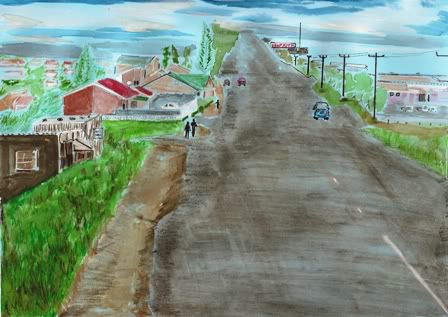Its your presence that attracted me,
your smile that lights up a room,
your touch that heals all wounds,
its your kiss that killed me when ur lips met mine and caused an eclipse
and we closed our eyes in each others arms and drowned in our own breaths,
motions of up n down
fusing the colors pink n brown
tongue tasting ur skin,
the softer side of my heart lost in ur being,
ADDICTED to ur tears of PASSION…
that cleanses my soul
making that instance in my life one that is magical, beautiful, perfect, ADDICTIVE!!!




The Appeal of Black Consciousness
In 1954 Hendrik Verwoerd, one of the main architects of the apartheid system, said that blacks ought not to be trained above certain “forms of labour”. This was intended to limit the prospects and possibilities of black people in South Africa  The statement, viewed from a post Apartheid vantage point, can easily be dismissed as words of a twisted old crank. It would, however, be very naive on our part to adopt this attitude. For one thing, the thinking behind the statement was to shape policies and programmes that were to affect generations of black South Africans. Black people’s possibilities were to be limited in ways that threatens their human being-ness; their agency; their capacity to being human in their own terms. The Black Consciousness philosophy is essentially a response to this thinking and its social, political and economic consequences.Â
To be sure, there is a certain arrogance in the historical black consciousness movement’s response to the white supremacist Apartheid thinking. One can almost hear Biko, the black consciousness theorist, telling Verwoerd and his cronies “who the hell are you to tell me what I can and can’t learn? Who are you to tell me how far I can go in life?” The title he adopts for some of his articles is telling “I Write What I Like”, and to fool the system he refers to himself as “Frank Talk”. This is a man who, in his “writing” and “frank talk” dared to defy the limitations and restrictions set by white supremacist ideologies and politics on himself and his ilk.Â
The Apartheid system buttressed by Verwoerd, set definite limits and restrictions on the possibilities of black South Africans. In thought and practice, the Black Consciousness response to the system was to defy these limitations. Black Consciousness has articulated black defiance and the rejection of standards set for black people as a precondition for freedom.  A refusal to conform to standards set by the system is accompanied by a call to take initiative, to test what the realm of possibility is and to shape a future. “On his own, therefore, the black man wishes to explore his surroundings, and test his possibilities. In other words to make his freedom real by whatever means he deems fit.” “Black man you are on your own” became a rallying cry for a generation of BC thinkers and activists in the 70s.Â
Within the context of a society still addressing the legacies of the white supremacist politics, ideologies and economies, Black Consciousness remain appealing to some of us. It remains appealing in its nullification of historical limits set on blackness. It remains appealing in it capacity to inspire the speaking of truth to power. It remains appealing in its call for imagination, initiative, the creation of a different reality and the expansion of our human possibilities.